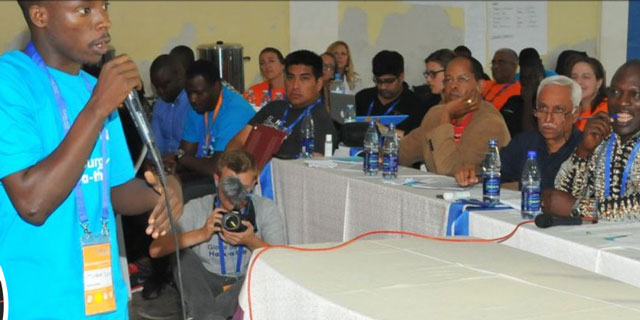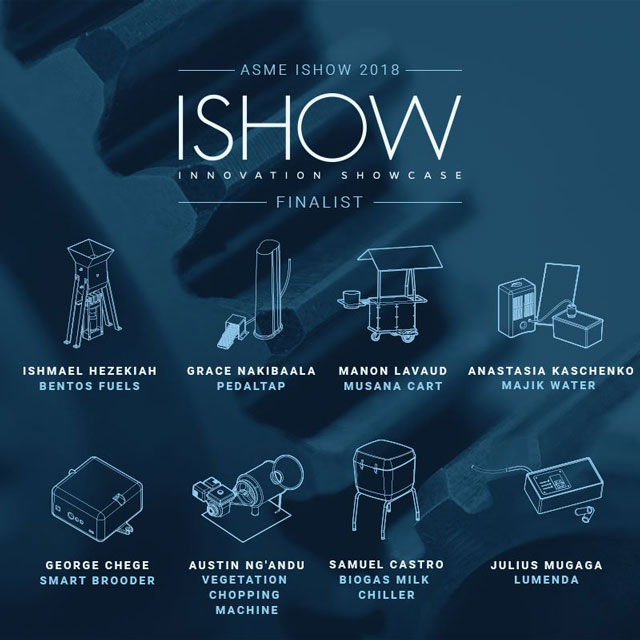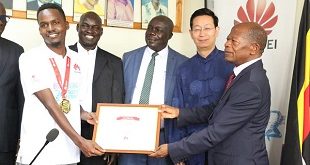
Eight African inventors finalists in global competition for social-driven hardware
New York, US | THE INDEPENDENT | Eight African inventors, including three from Uganda, have been named finalists in the first global competition to recognize and reward hardware designs that have a social purpose.
The Ugandans are Julius Mugaga of Lumenda ,an affordable and portable device for rapid and accurate diagnosis of neonatal bacterial meningitis, Manon Lavaud (Kampala, Uganda) of Musana Cart and Grace Nakibaala of PedalTap, a no-touch, cost-effective, water-dispensing system.
The American Society of Mechanical Engineers (ASME), the world’s largest organization for mechanical engineering, on Monday announced the regional finalists for the 2018 ASME Innovation Showcase (ISHOW), the first international competition to recognize and reward hardware-led social innovation.
The finalists of the 2018 ASME ISHOW will compete in Nairobi on Thursday, May 10 for a share of $500,000 in prize money and in-kind support. The eight social-minded inventors from eastern and central parts of Africa (three from Uganda, one from Zambia, and four based in Kenya) will showcase prototypes for clean fuel, safe drinking water, infectious disease mitigation and neonatal meningitis diagnosis, among others.
Africa will be the second region where finalists selected from over 150 entries worldwide will compete. A panel of esteemed experts recently announced winners in South Asia and is currently evaluating design submissions from the United States.
“ASME originally created ISHOW after our research showed an urgent need to support hardware innovators seeking to enter global markets and make a societal impact,” said Charla K. Wise, president of ASME. “We believe this year’s entries all have the potential to address some of the most vexing issues faced by humankind.”
The 2018 ASME ISHOW will feature a range of devices that promise to make a transformational economic, environmental, and social impact in underserved communities around the world. During the competition, the finalists will pitch their product prototypes to a panel of judges that include successful entrepreneurs, academics, and founders of venture-funded startup companies. The pitches will outline the engineering design attributes of the prototypes and also include a discussion of plans for manufacturing, implementation, marketing, and financing.
“ASME congratulates all finalists,” noted Wise. “We celebrate their new ideas and innovations, which are pushing our collective knowledge frontier outward and solving problems to improve the lives of all people.”
A Makerere University graduate, @NakibaalaG launched a foot-operated water tap to reduce chances of disease spreading in hand-held taps. The #PedalTap is a free-standing, universally-fitting connection that can be attached to any water tap. https://t.co/DftDprrmTt via @observerug pic.twitter.com/wwGx70NrzJ
— Chris Mukasa (@ChrisMukasa) March 28, 2018
One of the rare equipment…washer pic.twitter.com/pCd3DCwAFh
— mugaga julius (@MugagaJulius) April 17, 2018
#Solar-powered street vending carts are coming to #Africa’s cities. Learn from the entrepreneurs behind the project: https://t.co/ARKIzgJrIR pic.twitter.com/xUi7NMu6kO
— World Bank Africa (@WorldBankAfrica) April 8, 2018
Julius Mugaga (Kampala, Uganda) – Lumenda is an affordable and portable device for rapid and accurate diagnosis of neonatal bacterial meningitis in low-resource settings. It is designed to save the lives of thousands of neonates each year who are not treated properly due to the high cost of diagnosis.
Manon Lavaud (Kampala, Uganda) – Musana Cart provides the tools and support to street vendors to achieve a clean, sustainable, and dependable work environment. A solar panel is incorporated in the canopy of the cart to provide vendors with light after sundown. It also replaces charcoal for cooking with a more efficient, eco-friendly alternative fuel.
Grace Nakibaala (Entebbe, Uganda) – PedalTap is a no-touch, cost-effective, water-dispensing system actuated by a foot-pedal. It can be connected to any tap system and is designed to reduce the spread and frequency of infectious diseases in public spaces.
Ishmael Hezekiah (Nairobi, Kenya) – Bentos Fuels has developed an innovative recycling process using harvested water hyacinth, an invasive plant species, and mixing it with paper sludge and charred waste biomass. This process results in a unique resin, which is used to produce smokeless charcoal briquettes that are efficient, affordable and environmentally friendly.
Samuel Castro (Nairobi, Kenya/Netherlands) – Biogas Milk Chiller by SimGas enables off-grid dairy farmers to store, deliver, and sell the highest possible quantity of milk. Milk is kept cool overnight until it is delivered and sold the next day. This decreases milk spoilage and increases income potential for dairy farmers.
Anastasia Kaschenko (Nairobi, Kenya) – Majik Water is creating a new source of affordable, safe, and accessible drinking water to people in arid parts of the world. It uses cutting-edge technology combined with locally-adapted design to harvest water from the atmosphere and deliver it to communities that need it most.
George Chege (Nairobi, Kenya) – Smart Brooder is an environmental controller that assists farmers by ensuring the conditions within the chicken brooding space are kept within optimal levels. It reduces reliance on charcoal as a source of heat by using infrared bulbs, which are highly efficient and have minimal impact on the environment.
Austin Ng’andu (Kafue, Zambia) – Vegetation Chopping Machine chops maize stalks, twigs, and grass for longer-term storage of livestock feed. It helps provide feed during the dry season when there is little or no pasture and improves the living standards of small-scale farmers and the livestock on which they depend.

 The Independent Uganda: You get the Truth we Pay the Price
The Independent Uganda: You get the Truth we Pay the Price


